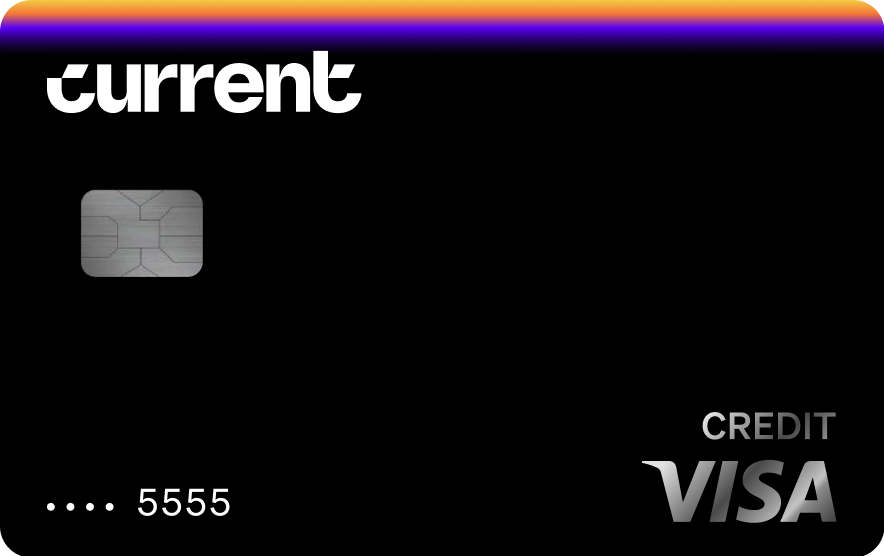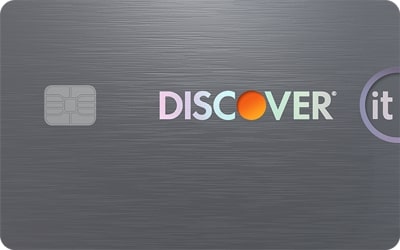Current Build Card: Plenty of Perks for Credit Newbies
The Bottom Line
5.0
All told, this card is a solid and affordable option for those wanting to build or mend their credit history with little risk of getting into debt trouble.

Rates, fees and offers
Rates, fees and offers
Annual fee
$0 (see terms)
Rewards rate
N/A
Bonus offer
N/A.
Intro APR
N/A
Ongoing APR
N/A
Foreign transaction fee
3% of the full transaction amount
More details from Current
More details from Current
- Get credit for every swipe - Just use your card, even at the ATM, to build credit with every swipe, earn points, and more.
- Build credit not debt - Build credit using only the money in your account and enable AutoPay so you never miss a payment.
- Credit for everyone - No matter what your credit history, there are no credit checks required to apply and build credit.
- Get paid up to 2 days faster - With direct deposit get your paycheck up to 2 days faster, so you get the money you need exactly when you need it.
- Earn points on swipes - Earn up to 7x the points on card swipes at over 14,000 participating merchants, then redeem them for cash back.
Pros and Cons
Pros
No annual fee (other fees may apply)
No credit check
No APR
Adjustable credit limit
Earns rewards
Cons
Must open a Current account
No upgrade path
Detailed Review
The Current Build Card — from the financial technology company Current — is similar to other recent alternative credit cards promising low barriers to entry for those with bad or limited credit.
Issued by Cross River Bank, the card does have a lot going for credit newbies. It reports to all three major credit bureaus, doesn’t require a credit check or a minimum security deposit, and doesn't charge an annual fee. There's no annual percentage rate (APR) either, so your risk of getting into debt is slim to none. The card also offers the ability to earn rewards. That's an impressive combination.
However, the Current Build Card lacks some perks that can be found in more traditional secured credit cards.
While any credit card's rewards, benefits and fee structure can be adjusted at any time, new cards from startup financial technology companies are particularly prone to significant changes as they find their place in the market. Keep that in mind as you research your credit card options.
Current Build Card: Basics
Card type: Secured and alternative.
Annual fee: $0 (see terms).
Sign-up bonus: $0.
Rewards: 1 point per dollar spent on eligible dining and grocery purchases when you have an eligible payroll deposit.
APR: N/A.
Foreign transaction fee: 3%.
Compare to Other Cards

Benefits and Perks
No minimum deposit required
You must open a Current account before applying for the Current Build Card. Funds transferred into the Current account become your security deposit, and thus your credit limit, for the card. But unlike traditional secured cards, which typically require a $200-$300 security deposit upfront to open the credit account, the Current Build Card doesn’t have a deposit minimum.
No credit check required
A hard credit pull isn’t required to get the Current Build Card, so potential cardholders don’t have to worry about a temporary loss of points to their credit scores when they apply.
No APR
After you make a purchase with the Current Build Card, Current automatically holds the amount of that transaction, decreasing your amount of available credit. In this way, Current Build cardholders can’t spend beyond what they can afford to pay, a crucial difference from typical unsecured cards. There's no APR because you literally can't carry a balance month to month.
It earns rewards
The Current Build Card earns 1 point per dollar spent on eligible dining and grocery purchases, but you have to meet certain requirements to earn them. For instance, you must have at least $500 in eligible payroll deposits into your Current Account over a rolling 35-day period, and at least one eligible payroll deposit must equal a minimum of $200.
Points can be redeemed within the app for cash back to your Current account or for other offers. Points are worth 1 cent each. The minimum redemption amount is 100 points, or $1.
There’s no limit to the number of points that cardholders can earn, and they expire one year after the date they are posted to your available points balance in the mobile app.
See more from Current
You may earn Points in connection with your everyday spending and by completing other actions that Current designates as subject to the Current Points Program. The amount of Points granted for different actions as well as the purchase requirements necessary to earn Points will vary, and is subject to Current’s sole discretion. After qualifying, please allow 3-5 business days for points to post to your Current account. Points will expire 365 days after they settle. The Current Points program is not available to Teen Account holders. See Current Points Terms and Conditions.
Drawbacks and Considerations
No upgrade path
Current doesn’t have an unsecured card that Current Build Card holders can graduate to after responsible use. Instead, when cardholders are ready for an unsecured card with better benefits, they’ll have to apply for a card from another issuer.
That's a common drawback among fintech cards in Current's class, and it's compounded by the fact that these cards may leave you unprepared to manage a traditional unsecured credit card — a product that dispenses with the guardrails and has high interest rates, along with an assortment of potential fees.
If you're seeking a starter credit card with an upgrade path, consider more traditional secured cards from major issuers. The Capital One Platinum Secured Credit Card, for example, might grant you a $200 credit limit with a lower initial deposit if you qualify ($49, $99 or $200, depending on your credit). Or with the Discover it® Secured Credit Card, which requires a $200 security deposit, you get ongoing rewards on all purchases, not to mention a welcome bonus. And both of those cards have potential upgrade paths to better products within their issuers’ respective portfolios.
Hidden fees can add up
While the Current Build Card has a $0 (see terms) annual fee, you might incur other fees with this card, including the following:
Out-of-network ATM fee: $2.50 per transaction.
Late payment fee: 3% of the total outstanding balance.
Foreign transaction fee: 3% of the total transaction amount.
Card replacement fee: $5 per card ($30 for expedited delivery).
Cash deposit fee: $3.50 per deposit.
The card's terms also mention the possibility of "third-party processing fees."
Foreign transaction and late fees aren’t unusual among credit cards, but a card replacement fee is. And there are plenty of banks that don’t charge any ATM fees or that offer reimbursements for out-of-network transactions.
How To Decide If It's Right For You
The Current Build Card could be an ideal fit for those who can't afford a traditional upfront security deposit of hundreds of dollars, or who don't want to tie up that money for months on end. And some of its guardrails — including no hard credit inquiry and no APR — could appeal to those who are looking to bolster their credit or avoid the temptation to overspend.
Just be aware that the card's primary weakness, the absence of an upgrade path, is not something you'd have to worry about with a traditional secured credit card from a major issuer.
Graduate to another card in as little as seven months
The Discover it® Secured Credit Card requires a minimum $200 upfront security deposit, but it earns straightforward rewards, has a bonus offer for new cardholders and doesn’t have a minimum credit score requirement. And you can get that deposit back if you close the account in good standing or, better still, if you're eventually eligible to upgrade to a different Discover product.
Looking For Something Else?
Methodology
NerdWallet reviews credit cards with an eye toward both the quantitative and qualitative features of a card. Quantitative features are those that boil down to dollars and cents, such as fees, interest rates, rewards (including earning rates and redemption values) and the cash value of benefits and perks. Qualitative factors are those that affect how easy or difficult it is for a typical cardholder to get good value from the card. They include such things as the ease of application, simplicity of the rewards structure, the likelihood of using certain features, and whether a card is well-suited to everyday use or is best reserved for specific purchases. Our star ratings serve as a general gauge of how each card compares with others in its class, but star ratings are intended to be just one consideration when a consumer is choosing a credit card. Learn how NerdWallet rates credit cards.
About the author

Jae Bratton
Lead Writer & Content Strategist


